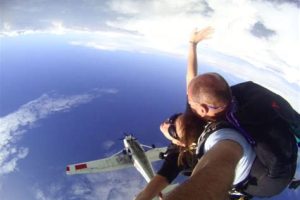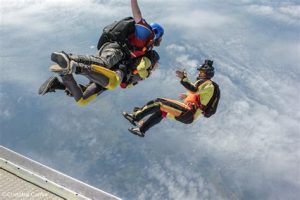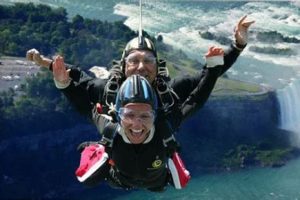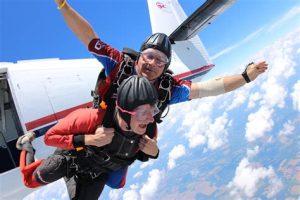Table of Contents
Discover the exhilarating world of tandem skydiving with epilepsy. Experience the ultimate adrenaline rush as you jump from a plane in the safe company of a professional instructor. Learn about the precautions, guidelines, and safety measures that make tandem skydiving accessible for individuals with epilepsy. Take the leap and conquer your fears while enjoying breathtaking views and an unforgettable adventure.
Are you ready to embark on an exhilarating adventure that will leave you breathless and filled with adrenaline? Look no further than tandem skydiving, a heart-pounding activity that allows you to experience the thrill of freefalling from thousands of feet in the air. Now, you might be wondering if this adrenaline-inducing experience is suitable for individuals with epilepsy. Well, fear not, because in this article, we will provide you with all the information you need to know about tandem skydiving with epilepsy. So, fasten your seatbelts, put on your safety gear, and get ready to learn how you can take to the skies and conquer your fears, even with epilepsy by your side!
Introduction
Deciding to go skydiving is an exhilarating and daring adventure that many individuals dream of experiencing. However, for someone with epilepsy, the question of whether tandem skydiving is safe and possible often arises. This article aims to provide instructions and guidance for those with epilepsy who wish to embark on this thrilling activity.
Tandem Skydiving: A Brief Overview
Tandem skydiving involves jumping from an aircraft while attached to an experienced instructor who controls the parachute and ensures a safe landing. It is the most common form of skydiving for beginners and offers an incredible opportunity to experience the rush of freefall without the need for extensive training.
Consult Your Healthcare Professional
If you have epilepsy and are considering tandem skydiving, it is crucial to consult with your healthcare professional beforehand. They will assess your condition, review your medical history, and provide advice tailored to your specific situation. Their expertise will help determine if you are physically and mentally fit for such an activity.
Obtain Medical Clearance
Prior to engaging in any extreme sport, including tandem skydiving, acquiring medical clearance is essential. The clearance can be obtained by providing your healthcare professional with detailed information about the activity, its associated risks, and any safety measures taken by the skydiving facility. This step ensures that your epilepsy is stable and adequately managed, reducing the chances of an adverse event during the jump.
Choose a Reputable Skydiving Facility
When selecting a skydiving facility, it is crucial to choose one with a strong reputation for safety and professionalism. Look for facilities that have experience accommodating individuals with medical conditions and inquire about their protocols for tandem skydiving with epilepsy. Reading reviews and seeking recommendations from fellow skydivers can help you make an informed decision.
Inform the Skydiving Instructor
Once you have chosen a reputable skydiving facility, inform the instructor about your epilepsy. Share relevant information about your condition, including triggers, medications, and any precautionary measures you take. The instructor will be able to tailor their approach and provide additional guidance to ensure a safe and enjoyable experience for both of you.
Wear a Helmet with Padding
As an extra precaution, wearing a helmet with padding during your tandem skydive is highly recommended. The helmet can help protect your head in case of any unexpected impact or seizure-related movements. Discuss this with the skydiving facility beforehand to ensure they can accommodate your request and provide suitable protective gear.
Follow Proper Safety Procedures
Prior to the jump, carefully listen to and follow all safety procedures outlined by your instructor. Pay close attention to the instructions given during the pre-jump briefing, including how to position your body during freefall and landing. Following these procedures diligently will significantly enhance your safety and the overall experience.
Consider the Weather Conditions
Weather conditions play a crucial role in skydiving safety. Ensure that the weather on the day of your tandem skydive is suitable for jumping. Extreme weather conditions or strong winds can increase the risks associated with the activity. Consult with the skydiving facility and reschedule if necessary to ensure optimal safety.
Listen to Your Body
During the entire process, listen to your body and be aware of any warning signs or discomfort. If you experience any unusual sensations, dizziness, or aura before the jump, inform your instructor immediately. It is always better to err on the side of caution and prioritize your well-being.
Enjoy the Experience!
Tandem skydiving with epilepsy is possible with proper preparation, medical advice, and precautions. By taking these necessary steps, you can embark on an extraordinary adventure that allows you to conquer your fears and create memories that will last a lifetime. Embrace the adrenaline rush and enjoy the unique perspective of the world as you soar through the sky!
Introduction
Welcome to our guide on tandem skydiving with epilepsy. We understand that individuals with epilepsy may have concerns about participating in this thrilling activity, so we have compiled some important information to ensure a safe and enjoyable experience.
Preparing for Tandem Skydiving
Medical Consultation:
Prior to engaging in tandem skydiving, we strongly recommend consulting with your neurologist or healthcare provider who can assess your seizure control and the potential risks involved. It is important to discuss your intention to skydive and provide your doctor with detailed information about the activity along with our safety protocol.
Choosing a Reputable Skydiving Center
Researching Skydiving Facilities:
It is imperative to select a skydiving center with experienced instructors who are knowledgeable about epileptic conditions and the necessary precautions. Take the time to research reviews and recommendations, ensuring that the center has a good safety record, adequate equipment, and thorough training procedures.
Communication with Your Tandem Instructor
Full Disclosure:
Always disclose your epilepsy diagnosis and provide your instructor with relevant medical details. Openly discuss your concerns, triggers, and any necessary adaptations to ensure a well-informed and prepared instructor. Ask about their experience with participants with epilepsy and inquire about the protocols they have in place to handle any potential emergencies.
Safety Precautions during the Jump
Wearing Protective Gear:
In addition to the standard skydiving equipment, we recommend wearing a helmet with extra padding to minimize the impact in case of a seizure. Ensure that your tandem instructor is aware of any additional safety measures that may be necessary for your specific condition.
The Skydiving Experience
Anxiety Management:
As tandem skydiving can be an adrenaline-inducing activity, it is important to manage any anxiety or stress that may increase the likelihood of a seizure. Utilize relaxation techniques, such as deep breathing or visualization exercises, to help stay calm and focused before and during the jump.
Post-Skydiving Care
Rest and Recovery:
After your skydiving experience, it is essential to prioritize rest and recovery to minimize exhaustion and reduce the risk of triggering a seizure. Ensure you have proper support and assistance available as you may experience fatigue or post-activity muscle soreness.
Conclusion and Additional Resources
Tandem skydiving with epilepsy is possible with proper planning, communication, and adherence to safety protocols. Always remember to consult with your healthcare provider, establish open communication with your tandem instructor, and follow the necessary precautions specific to your condition.
Note: This guidance is provided for informational purposes only and should not override any medical advice. Always consult your healthcare provider before engaging in any physical or high-risk activities, including tandem skydiving.
Point of View: Tandem Skydiving With Epilepsy
Instructions for Safe Participation
When it comes to tandem skydiving with epilepsy, safety is of utmost importance. While individuals with epilepsy can still enjoy the thrilling experience of skydiving, it is crucial to follow specific guidelines to ensure a safe and enjoyable adventure. Here are some instructions to consider:
- Consult with a medical professional: Before embarking on any adventure, it is essential to consult with your healthcare provider. They can provide valuable insights into your condition and determine if tandem skydiving is suitable for you. Your doctor may also recommend precautions or provide specific instructions tailored to your needs.
- Choose a reputable skydiving center: Selecting a reputable skydiving center with experienced instructors is vital. Look for facilities that have a track record of safety and prioritize customer well-being. These centers should have staff members who are knowledgeable about epilepsy and its management during skydiving activities.
- Inform the skydiving center: Ensure that you disclose your epilepsy diagnosis to the skydiving center when making your reservation. This information will allow them to make appropriate arrangements and provide any necessary accommodations. Open communication is key to ensuring your safety.
- Bring a companion: It is advisable to bring a trusted companion along who is aware of your epilepsy and knows how to respond in case of a seizure. This person can provide additional support and reassurance throughout the experience.
- Follow all safety protocols: Pay close attention to the safety briefing provided by the skydiving instructors. Follow their instructions meticulously, especially regarding the equipment and body positioning during the jump. Adhering to these protocols will minimize any potential risks and ensure a safe landing.
- Consider tandem skydiving: Tandem skydiving is highly recommended for individuals with epilepsy, as it involves jumping with an experienced instructor who is responsible for deploying the parachute and managing the entire descent. This way, you can fully enjoy the experience while feeling confident in the expertise of your instructor.
- Be aware of triggers: Understand your personal seizure triggers and take necessary precautions to avoid them during the skydiving experience. For example, if bright lights or flashing visuals trigger seizures, discuss this with the skydiving center to ensure that appropriate measures are taken to minimize these triggers.
- Monitor your health: Prior to the jump, ensure that you are well-rested, properly hydrated, and have taken any necessary medications as prescribed by your doctor. Maintaining good overall health and managing your epilepsy effectively will contribute to a safer and more enjoyable skydiving experience.
By following these instructions and taking necessary precautions, tandem skydiving can be a thrilling and memorable adventure for individuals with epilepsy. Remember, safety should always be the top priority, and open communication with your healthcare provider and the skydiving center is crucial to ensure a successful and enjoyable experience.
Thank you for taking the time to read our blog post on tandem skydiving with epilepsy. We understand that this is a topic of concern for many individuals who are living with epilepsy or have loved ones who do. In this article, we have aimed to provide you with important instructions and guidelines to ensure a safe and enjoyable experience for those interested in tandem skydiving.
First and foremost, it is crucial to consult with your healthcare provider before attempting any high-risk activities, including skydiving. Your doctor knows your medical history best and can provide you with personalized advice based on your specific condition. It is essential to follow their instructions and discuss any concerns you may have.
When considering tandem skydiving, it is important to choose a reputable skydiving center that has experience working with individuals who have epilepsy. Look for centers that have licensed instructors who are trained in handling various medical conditions. These professionals will be knowledgeable about the necessary precautions and safety measures that need to be taken to ensure a smooth experience.
Furthermore, it is advisable to disclose your condition to the skydiving center beforehand. This will allow them to make the necessary arrangements and accommodate your needs accordingly. They may require additional medical documentation or clearance from your healthcare provider before allowing you to participate. It is always better to be transparent about your condition to ensure everyone’s safety and peace of mind.
In conclusion, while tandem skydiving can be an exhilarating experience, it is essential to prioritize your safety and well-being. By consulting with your healthcare provider, choosing a reputable skydiving center, and disclosing your condition, you can minimize potential risks and enjoy the thrill of skydiving with peace of mind. Remember, your health should always be your top priority, and there are plenty of other exciting activities that you can engage in if skydiving is not suitable for you. Stay safe and enjoy your adventures!.
People also ask about Tandem Skydiving With Epilepsy:
-
Is it safe for someone with epilepsy to go tandem skydiving?
Tandem skydiving can be risky for individuals with epilepsy as there is a potential risk of seizures during the activity. It is important to consult with your healthcare provider before considering tandem skydiving to assess the safety based on your specific condition.
-
What precautions should someone with epilepsy take before going tandem skydiving?
Before tandem skydiving, individuals with epilepsy should:
- Consult with their healthcare provider to evaluate the suitability and potential risks.
- Ensure that their seizures are well-controlled and they have been seizure-free for a significant period recommended by their doctor.
- Inform the skydiving instructor and staff about their condition, providing necessary medical information and emergency contact details.
- Consider having a support person present during the activity who is knowledgeable about their epilepsy and can provide assistance if needed.
-
Are there any specific equipment or procedures in place for tandem skydiving with epilepsy?
While there are no specific equipment or procedures exclusively designed for tandem skydiving with epilepsy, it is essential to follow general safety guidelines and protocols provided by the skydiving center. These may include:
- Ensuring proper harnessing and securing of the individual during the jump.
- Having an experienced instructor who is trained to handle emergency situations.
- Having a comprehensive emergency plan in place, including access to medical assistance if required.
-
What are the potential risks of tandem skydiving for someone with epilepsy?
The potential risks for individuals with epilepsy considering tandem skydiving include:
- Increased stress levels during the jump, which may trigger seizures in some individuals.
- Possible side effects or interactions between anti-seizure medications and the physical demands of skydiving.
- Risk of injury during landing if a seizure occurs mid-flight.
-
Should someone with epilepsy disclose their condition to the skydiving center?
Yes, it is crucial for individuals with epilepsy to disclose their condition to the skydiving center. This information allows the staff to be prepared, take necessary precautions, and provide appropriate support during the activity.






